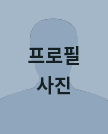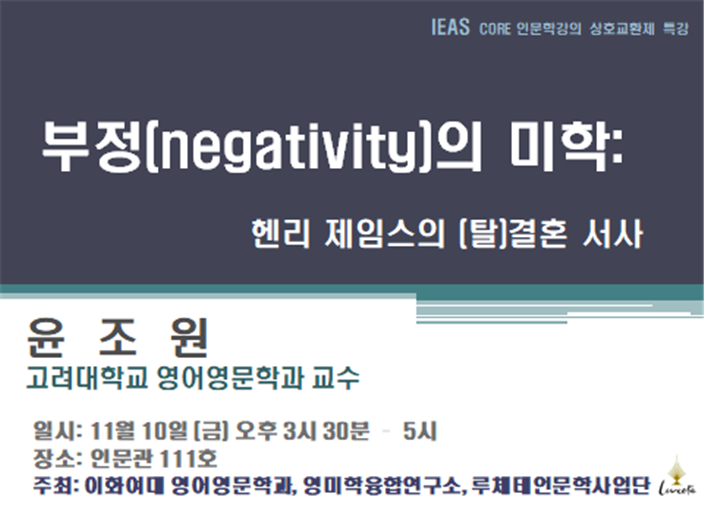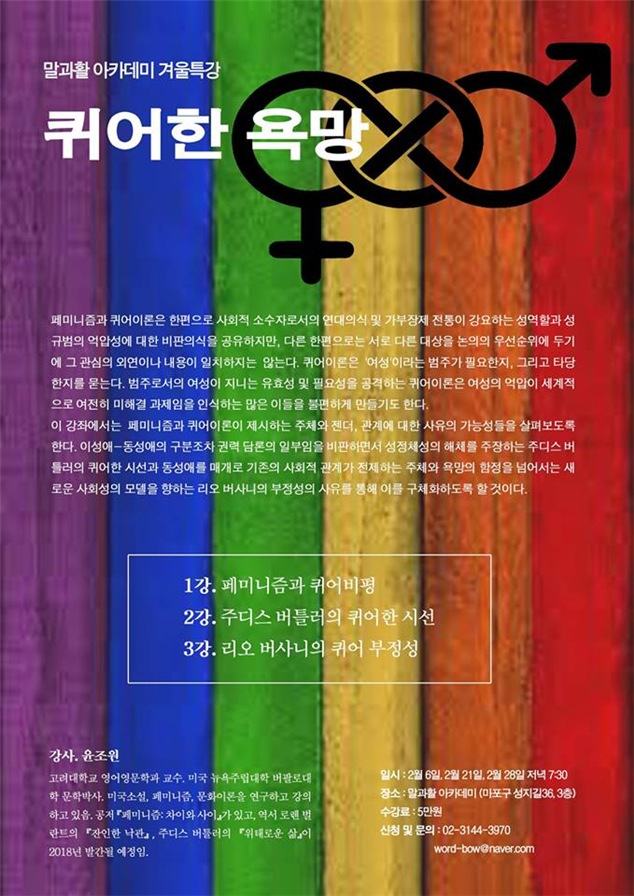소개

Prof. 윤조원 (Joewon Yoon)
Tel: 02-3290-1997
E-mail: joewon@korea.ac.kr
- About Professor
- Recent Activities
- Curriculum Vitae
- Graduate Seminars
Profile
Nineteenth-century American fiction--Henry James, Herman Melville, Mark Twain, and women writers--is the mainstay of my research activities. I pay particular attention to how masculinity, as well as femininity, becomes a discursive locus of political and aesthetic contestation, and how literature facilitates and intervenes in such contestations. My publications are interdisciplinary and topically diverse, ranging from early American literature to Korean popular culture. Also of special interest to me are the ways in which nineteenth-century American fiction critically archives racial politics of the time. Feminism, gender studies, queer theory, critical theory, and psychoanalysis form a matrix upon which I pursue interlocked questions of literature, aesthetics, politics, and ethics.
Recent Activities
2017년 11월, 이화여자대학교 특강: “부정(negativity)의 미하기 헨리 제임스의 (탈)결혼 서사”

2018년 1-2월, 말과활 아카데미 겨울특강 <퀴어한 욕망>

Curriculum Vitae
JOEWON YOON, Ph.D.
- Professor
- Korea University
- Department of English Language and Literature
- College of Liberal Arts
- Anam-ro, Seongbuk-gu (02841)
- Seoul, Korea
- Tel (office): +82-2-3290-1997
- Mobile: +82-10-9082-3159
- joewon@korea.ac.kr
Education
- ∙ Ph.D., English Literature, State University of New York at Buffalo, January 2001
- ∙ B.A., summa cum laude, English Literature, Korea University, Seoul, Korea, February 1991
CAREER in Teaching and Research
- ∙ Professor, Korea University (March 2013 – present)
- ∙ Associate Professor, Korea University (March 2009 – February 2013)
- ∙ Assistant Professor, Korea University, Seoul (March 2006 – February 2009)
- ∙ Assistant Professor, Sangji University, Wonju, Korea (March 2003 – February 2006)
- ∙ Instructor, Korea University, Seoul (September 2001 – February 2003)
- ∙ Post-Doctorate Fellow, Korea University, Seoul (March 2001 – February 2002)
- ∙ Instructor, State University of New York at Buffalo (August 1996 – December 2000)
DISSERTATION
“Aesthetic Commerce of the Feminine: Henry James and Late Nineteenth-Century American Literature”
- ∙ Chair: Dr. Stacy Hubbard
- ∙ Readers: Drs. Neil Schmitz and James Holstun
- ∙ Outside Reader: Dr. Andrew Hewitt (UCLA)
AWARDS AND FELLOWSHIPS
- ∙ Essay of the Year, English Languag and Literature Association of Korea, 2013
- ∙ Anam Teaching Awards, 2006, 2007, 2008, 2009, 2011
- ∙ Fulbright Fellowship, 1993-1997
Books
- ∙ Feminisms: Interstices and Differences (editor, co-author; Korean). 2011. Seoul.
- ∙ Social Change and Female Subjects (co-author; Korean). 2007. Seoul.
- ∙ Female Body: Perspectives, Agendas, History (co-author; Korean). 2005, Seoul.
Translations
- ∙ Henry James, The Bostonians (Forthcoming. 문학동네)
- ∙ Judith Butler, The Precarious Life (Forthcoming. 필로소픽)
- ∙ Laurent Berlant, Cruel Optimism (co-translator) (Forthcoming. 후마니타스)
Articles
- ∙ “ Intimacies: Queer Negativity of Leo Bersani” (Korean), 2017, Seoul.
- ∙ “The Aesthetics of Perversion: Between Dreaming and Waking in Djuna Barnes’s Nightwood,” 2017, Seoul.
- ∙ “The Abyss of Desire, the Abjection of Love” (Korean), 2015, Seoul.
- ∙ “The Road to Knowledge: Signifying Space in What Maisie Knew,” 2014, Seoul.
- ∙ “Melville’s Boys: Queer Marriage and the Narratives of Masculine Maturation,” 2012, Seoul.
- ∙ “Theory ‘After Theory’: Terry Eagleton’s Critique and Ethics” (Korean), 2011, Seoul.
- ∙ “The Task of the Translator: Walter Benjamin and Cultural Translation” (Korean), 2011, Seoul.
- ∙ “Failure of the Narrative, or the Narrative of Failure?: Pierre and the Masculine Performance” (Korean), 2010, Seoul.
- ∙ “Ghostly Imagination, History, and Femininity at Centuries’ End: The Turn of the Screw and The Blair Witch Project,” Nothing That Is (Wayne State University), 2004.
- ∙ and many others
CONFERENCE PAPERS AND TALKS
-
∙ “James’s Legacy: Marriage Plot and Its Discontents,”
3rdInternationalHenryJamesConference,Paris.2016. - ∙ “Nocturnal Space in Djuna Barnes’s Nightwood,” ELLAK International Conference, Busan. 2015
- ∙ “Representing Masculinity in Korean Popular Culture,” 3rd Freie Universitat-KoreaNet Conference, Berlin. 2015.
- ∙ “‘Miss Watson's Nigger’ or ‘My Jim’?: Navigating Mark Twain's Legacy and Claiming African American History in My Jim,” Women's Worlds 2008 Conference, Madrid.
- ∙ and many others
TEACHING INTEREST
- ∙ 19th-CenturyAmericanliterature
- ∙ Modern American Novel
- ∙ Literary Theory (antiquity through contemporary)
- ∙ Theories in Gender and Sexuality
Graduate Seminars
2018년 1학기 <정신분석과 페미니즘> (비교문학비교문화협동과정)
Psychoanalysis and Feminism: Desire, Sexuality, Love
What does Sigmund Freud imply in his notorious (?) question—“What does a woman want?” What does Jacques Lacan imply by his much contested denial of the existence of “Woman”? These are only two instances of psychoanalysis that left many feminist critics skeptical as to the usefulness or even validity of psychoanalysis’s explication of sexual difference. When psychoanalysis is seen to provide a set of significant insights into the human subject as a desiring being, and therefore utilized as a vital tool for literary and cultural criticisms which challenge the hegemonic model of modern subjectivity, the (in)compatibility of feminism and psychoanalysis necessarily becomes an issue that takes readers and critics to serious task. This seminar is designed to tackle this very issue, so as to encourage students to explore possibly overlapping areas of these two theoretical discourses and construct their own methodological problematics and points of view.
In this seminar we focus on close reading of selected texts and will keep asking what “gender,” “sex,” and “sexuality” mean respectively, to flesh out answers that different theorists might offer. In particular, we will review how theories of sexuality and sexual difference have been advanced in Sigmund Freud’s work and also try to study how Freudian views were adopted, adapted, reinforced, and/or critiqued by later critics, including Jacques Lacan, Slavoj Žižek, Luce Irigaray, Gayle Rubin, Leo Bersani, Judith Butler, and so on.
Accordingly, the primary goal of the seminar will be understanding fundamental concepts, organizing arguments, and basic theoretical contours of some of the key texts of psychoanalysis. Discussions will be based on close reading of the listed texts, clustering around the following agendas, while not limited to them: sex, body, gender, sexuality, desire, identity, gender roles, woman, femininity, masculinity, love, marriage, domesticity, law, power, power relations, inequalities, hegemony, resistance, and subversion.
The objectives of this seminar also include investigating how theories of sex and sexuality intersect with feminist agendas; considering how psychoanalysis and feminist studies, in tandem, influenced critical approaches to the patriarchal grounding of gender positions; understanding how recent tendencies in gender studies expanded these issues; assessing the necessity or urgency of thinking gender and sexuality today; and finally, forming our own critical perspectives that will help us integrate our learnings to everyday practice as well as to our scholarly projects.
2018년 1학기 <미국소설> (영어영문학과)
American Novel I
This course surveys the history of American literature from the seventeenth century to the late-twentieth century. We will read works by American writers who contributed to the formation of the literary tradition of the United States, and study literary characteristics as well as historical and cultural contexts of each literary work we read. Through these efforts we will reach an extensive understanding of how American thoughts and literary expressions have developed since the colonial period to the present day.
